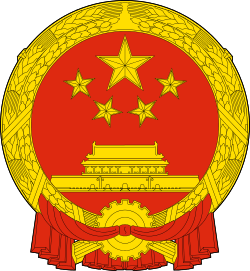Tiananmen Incident
| History of the People's Republic of China (PRC) |
|---|
 |
| History of |
| Generations of leadership |
|
|
| Tiananmen Incident | |||||||
| Chinese | 四五天安门事件 | ||||||
|---|---|---|---|---|---|---|---|
| Literal meaning | April 5 Tian'anmen Incident | ||||||
| |||||||
The Tiananmen Incident took place on April 5, 1976 at Tiananmen Square in Beijing, China. The incident occurred on the traditional day of mourning, the Qingming Festival, after the Nanjing Incident, and was triggered by the death of Premier Zhou Enlai earlier that year. Some people strongly disapproved of the removal of the displays of mourning, and began gathering in the Square to protest against the central authorities, then largely under the auspices of the Gang of Four, who ordered the Square to be cleared.
The event was labeled as counterrevolutionary immediately after its occurrence by the Communist Party's Central Committee and served as a gateway to the dismissal and house arrest of then-Vice Premier Deng Xiaoping, who was accused of planning the event. The Central Committee's decision on the event was reversed after the Cultural Revolution ended, as it would later be officially hailed as a display of patriotism.
Cause
The death of Chinese Premier Zhou Enlai on January 8, 1976, prompted the protest. Zhou Enlai was a widely respected senior Chinese leader. For several years before his death, he was involved in a political power struggle with other senior leaders in the Politburo of the Communist Party of China.
Premier Zhou's most visible and powerful antagonists were the four senior members who came to be called the Gang of Four. The leader of the clique, Jiang Qing, was married to Communist Party Chairman Mao Zedong. To defuse an expected popular outpouring of sentiment at Zhou's death, the Communist Party of China limited the period of public mourning; for example, the national flag was lowered to half-mast for only one hour.
Government response
China's leaders, namely Jiang Qing (Mao Zedong's wife) and Mao Yuanxin, saw the popular gathering as a threat to the forward movement of the Cultural Revolution. They consulted with Party Chairman Mao Zedong, claiming these people to be "capitalist roaders" who were hitting back at the Proletarian Revolution. Action was taken on the night of April 5, when the number of mourners were a few thousand. Controlled by Jiang Qing and the mayor of Beijing, the militia encircled the area, then went in with clubs and batons to drive the people away from the monument. Four thousand were arrested. According to Jan Wong in Red China Blues, around 60 were dragged into the Great Hall of the People, beheaded and secretly cremated.
The media subsequently linked the event to Deng Xiaoping, then carrying out the daily duties of the Premier. It was rumored that the Gang of Four had become apprehensive of Deng's influence and thus attempted his removal. Deng was an ally of Zhou Enlai, and was placed under house arrest in Guangzhou. After Mao's death and the fall of the Gang of Four in October 1976, Party leaders rehabilitated Deng and brought him back to Beijing, where he emerged as China's Paramount Leader in 1978.
See also
Further reading
- Wong, J. (1995). Red China Blues. New York. Doubleday/Anchor Books. 406 pages. Pages 165–171. ISBN 0-385-47679-5
- Cheng, N, (1996). Life and Death in Shanghai. New York. Penguin Books. 543 pages. Pages 470–471. ISBN 0-14-010870-X
- Teiwes, Frederick C. and Warren Sun, "The First Tiananmen Incident Revisited: Elite Politics and Crisis Management at the End of the Maoist Era," Pacific Affairs Vol:77 Issue:2 (2004) pp. 211–235.
- Cheater, A. P., "Death ritual as political trickster in the People’s Republic of China," The China Journal Vol:26 (1991) pp. 67–97.